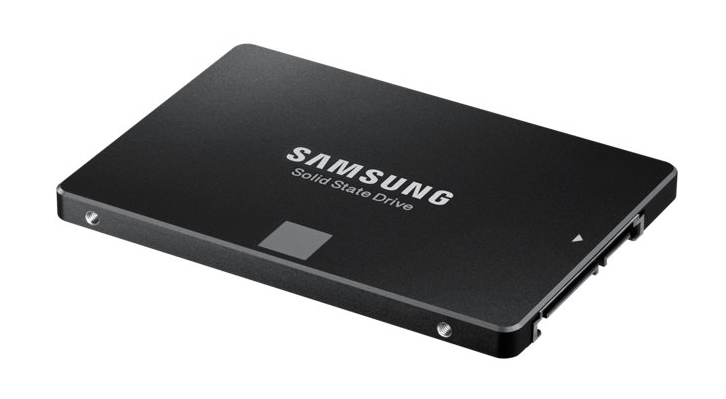Samsung 850 SSD Review
Why you can trust Tom's Hardware
Conclusion
Being able to write the world's first review of the new Samsung 850 was enough for us to break out the 128GB-class drives, but that doesn't mean we recommend low-capacity SSDs. The price difference between a 128GB and a 256GB-class SSD is usually very small, which means you pay more money per gigabyte for the smaller drive.
We found a great example at Newegg. The 850 EVO 120GB retails for $100, but the 850 EVO 250GB is yours for just $114. That means you pay $0.83-per-GB for the 120GB drive, but only $0.45-per-GB for the 250GB SSD.
The difference in price between two capacities can't happen with the Samsung 850, though. The series only comes in one capacity, but we don't expect that to last very long. Samsung didn't do much to differentiate the 32- and 48-layer 850 EVO SSDs, but we suspect the 850 may be a way to set the 64-layer V-NAND products apart. In larger capacities, the fastest V-NAND yet could offer better performance than its predecessors, at least under some conditions.
Knowing the 850’s placement in the Samsung stack would tell us more about the drive, and what to expect, so we reached out to Samsung USA for more information. They suggested that we should confer with Samsung China because that group is responsible for the release. That didn't go far. Without knowing the 850's market position, we can't reliably say if American and European audiences can expect to see this series. Small 64GB SSDs still sell for mainstream PCs in China, so 128GB drives are still popular.
In May, rumors surfaced that Samsung might remove the "Pro/EVO" branding, which denotes the difference between MLC (Pro) and TLC (EVO) SSDs, from its products because all of its new products will use 3-bit per cell (TLC) NAND. The appearance of 980 and 970 on the NVMe Integrator's List adds some credence to the rumor, but we also found an unreleased 860 EVO on the SATA Integrator list. That doesn't agree the non-Pro/EVO rumor mill.
The Samsung 850 should eventually sell in other markets, and it will likely appear on Newegg and Amazon through third-party sellers. The 120GB drive delivers the same performance we found in the 850 EVO, but it ships with a three-year warranty instead of a five-year warranty. The 850 120GB is a preview of what to expect from Samsung in the future even if we don't know exactly which direction the company is headed.
MORE: Best SSDs
Get Tom's Hardware's best news and in-depth reviews, straight to your inbox.
MORE: How We Test HDDs And SSDs
MORE: All SSD Content

Chris Ramseyer was a senior contributing editor for Tom's Hardware. He tested and reviewed consumer storage.
-
DerekA_C ha shortage my BUTT it's a cash cow right now as everyone is trying to switch over so why not make a few extra billion of gullible people just like everything else the fabs the money the time and investment is already there for years yet prices hiked bogusly, no one can convince me otherwise same with the GAS shortage all a bunch of BS to make extra billions to screw the population over PERIOD. Oh just like the LCD TV panel shortage HA then 4 companies including Samsung sued for 1 billion for strong holding the market. Practice as usual the elite finding new ways to make themselves more rich and powerful.Reply -
USAFRet So how is this new and different from the current 850 EVO drives?Reply
This, from my existing 850 EVO:
Yes, mine is a 500GB vs the test subject of 128GB, but just because there is a different TLA at the end of the model number does not make it 'better'. -
zodiacfml Not bad. I could use one but I bought 250GB EVO just a few days ago to match a 4TB HDDReply -
bit_user Please try to report the power-off data retention time of SSDs you review. As bits are being packed more densely, I suspect this number is falling and might already be low enough to cause issues for some people. For one MLC SSD I own, it's just 3 months.Reply -
Jeffs0418 Reply
How does one determine Power-off data retention time without TIME? That would fall under the Long-Term test.20426654 said:Please try to report the power-off data retention time of SSDs you review. As bits are being packed more densely, I suspect this number is falling and might already be low enough to cause issues for some people. For one MLC SSD I own, it's just 3 months.
-
mapesdhs Would be interesting to see how this compares to the old 840 and 840 Pro, and indeed the 830, see whether the competition has at least caught up to those older models (excluding the 840 EVO, too many issues with performance degradation over time).Reply
-
fanafirmino Must I endure a video of someone playing games everytime I hit your homepage??? Come on, there must be another way, guys!Reply -
bit_user Reply
It should be specified by the manufacturer, as in the case of my Intel drive. If it's not in the datasheet, then I would like the author to contact the manufacturer and ask them what it is. This will also hopefully send the message that people care about this attribute, and perhaps they'll be more mindful of it.20428005 said:
How does one determine Power-off data retention time without TIME? That would fall under the Long-Term test.20426654 said:Please try to report the power-off data retention time of SSDs you review.
